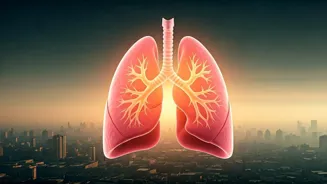Urban Smog's Grip
Urban areas often face high levels of air pollution, largely due to vehicle emissions, industrial activities, and construction. These pollutants, including
particulate matter (PM2.5 and PM10), nitrogen oxides (NOx), and sulfur dioxide (SO2), pose a significant threat to lung health. The small particulate matter can penetrate deep into the lungs, causing inflammation and increasing the risk of respiratory illnesses like asthma, bronchitis, and even lung cancer. Exposure to these pollutants can also exacerbate existing conditions, making it harder for individuals to breathe and reducing overall lung function. Considering the widespread presence of smog in many Indian cities, it is crucial to understand the risks and take measures to minimize exposure, such as using air purifiers, wearing masks in highly polluted areas, and supporting policies that promote cleaner air.
Stress's Silent Toll
Chronic stress, a pervasive issue in modern life, negatively affects lung health through various pathways. Stress can trigger the release of hormones like cortisol, which can lead to inflammation and weaken the immune system, making the lungs more vulnerable to infections and other respiratory issues. Additionally, stress can increase shallow and rapid breathing patterns, leading to hyperventilation and reduced oxygen intake. For individuals with existing respiratory conditions like asthma, stress can act as a trigger, worsening symptoms and increasing the frequency of flare-ups. Managing stress through techniques like meditation, yoga, and deep breathing exercises is crucial for maintaining lung health. Incorporating these practices into daily routines can significantly reduce the negative impact of stress and support healthy respiratory function.
Sedentary Habits' Effects
A sedentary lifestyle is another significant factor impacting lung health. Lack of physical activity can weaken the respiratory muscles, reducing lung capacity and efficiency. When the muscles that control breathing are not regularly exercised, they become less effective, making it harder to take deep breaths and reducing the amount of oxygen available to the body. This can lead to a decreased ability to clear mucus from the airways, increasing the risk of infections. Regular exercise, particularly activities that increase heart rate and breathing rate, can help strengthen respiratory muscles, improve lung function, and enhance overall respiratory health. Simple activities like brisk walking, cycling, or swimming can make a significant difference. It is recommended to engage in at least 150 minutes of moderate-intensity exercise per week to reap the benefits of improved lung health.
Lifestyle Changes for Health
Making conscious lifestyle changes can significantly improve lung health and overall well-being. First and foremost, avoiding exposure to pollutants is vital; this includes minimizing time spent in heavily polluted areas and taking precautions such as wearing masks when necessary. Secondly, quitting smoking and avoiding secondhand smoke are essential steps, as smoking damages the lungs and increases the risk of respiratory diseases. Regular physical activity is also crucial; engaging in activities that promote deep breathing and strengthen respiratory muscles helps improve lung function. Finally, managing stress through relaxation techniques, mindfulness, and a balanced lifestyle supports the respiratory system and reduces vulnerability to lung issues. Implementing these changes creates a proactive approach to safeguarding and improving lung health.













